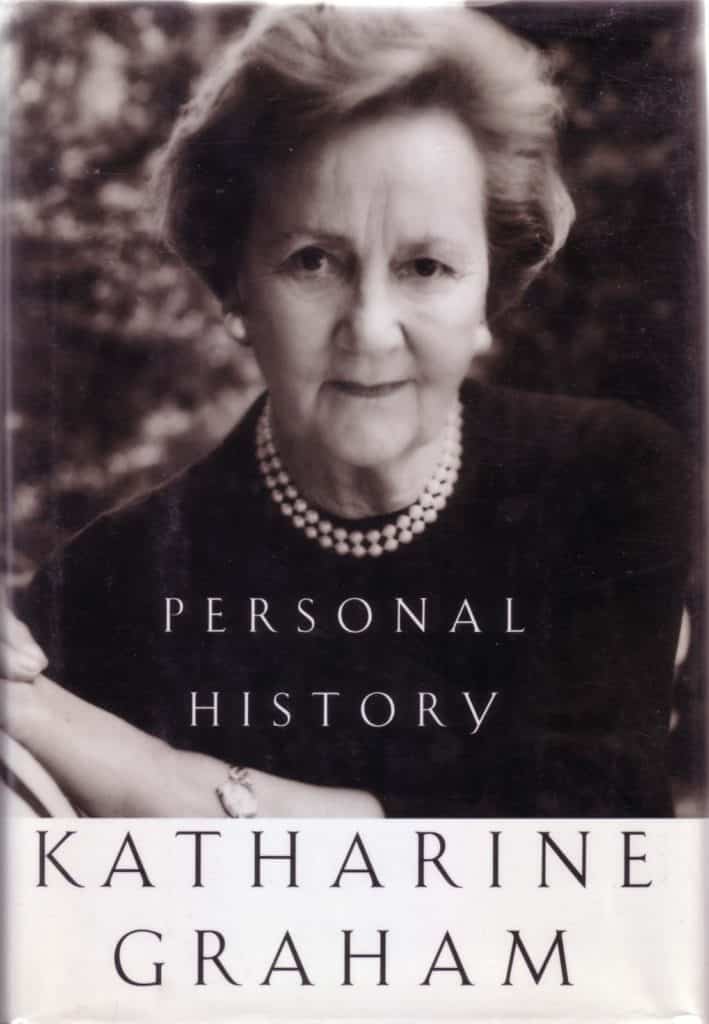The author of this autobiography is the former publisher and CEO of The Washington Post, a newspaper with a tremendous spread throughout the United States and beyond. The extensive autobiography titled simply Personal History, tells about the lives of her lineage (grandparents and parents) and how they influenced the outcome of her life. Obviously no outside sources are needed to determine whether or not the late Ms. Graham was qualified to write her own autobiography: therefore I shall defer the opening section to better suit the work I have selected. Was Katharine Graham’s life influential on enough people to make it worth recording and publishing? Yes: these are the memoirs of the first woman publisher of a major media outlet and being the first at anything like this makes your life’s story worthy of record.
Personal History spans the early days of her grandfather’s business ventures and the fateful meeting of her father and mother to Graham’s heavy-hearted takeover of the Post and her eventual retirement. It goes into great depth about the Watergate scandal and the role The Washington Post played in uncovering the truth (as well as the Nixon administration’s every attempt to sabotage the paper and Graham’s other assets through legalities). The main scope of the work, however, is of course on Katharine Graham herself and how the people around her shaped her into who she was when she recorded the memoirs.
Washington Post played in uncovering the truth (as well as the Nixon administration’s every attempt to sabotage the paper and Graham’s other assets through legalities). The main scope of the work, however, is of course on Katharine Graham herself and how the people around her shaped her into who she was when she recorded the memoirs.
She began her life as a rich daughter of Mr. and Mrs. Eugene Meyer, already millionaires before The Washington Post was conceived. From private school to private school, and later from college to college, Graham had held an interest in journalism. She remarked that early on her father had half-jokingly bantered with her about the possibility of her coming to write for the Post after he had acquired it (which he did for something in the neighborhood of $500,000). After college she moved for a while to the land of her grandparents, San Francisco, and wrote part-time for a small newspaper publication there (something which was nearly unheard of, a woman journalist for something other than Redbook and the like).
When in her mid-20’s, after writing for the newspaper in San Francisco for two years, she was given a genuine offer from her father to return to Washington and “help him run things.” He actually meant write up a column, which she did. While staying in Washington, she mingled with a crowd of well-to-do young people, freshly out of college and on their way to make a difference in the world. At one of the “Hatley Boys’” get-togethers, she met the man who would eventually become her husband: the handsome and intelligent young man, bound for success, Philip Graham.
Sometime after their marriage, it was clear that Eugene Meyer was looking to Philip as a possible “White Knight” for The Washington Post, as Eugene’s only son had shown no interest in going into business and a male was the preferred inheritor. Philip was given stock in the company and after the eventual death of Eugene Philip took over as publisher. He was relatively untrained and over the years had to learn the newspaper business and help the already-struggling Post gain strength and become a major publication.
Years of giving his blood, sweat and tears for the paper took a tremendous psychological toll on Philip. He eventually had an extramarital affair and after a while of bizarre behavior, committed suicide while Katharine was in a nearby room. Philip’s suicide left no one to run the paper but Katharine herself, forcing her to be the first woman to be publisher of such a huge media outlet. She had a lot to learn, and described the difference in watching Philip run the paper and actually doing it like the difference in “watching someone swim and actually swimming.” She was also not immediately how everyone, from her secretaries to print room workers to top-level journalists, was sizing her up. Katharine felt thereafter that she had the job of representing her gender in the corporate world.
If the book were meant to maintain a theme at all it would be the prevalence and resilience of the human spirit. Also, a good theme for the autobiography could be summed up as “big things come in small packages (referring to the author herself).”
